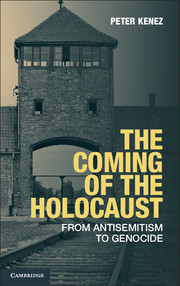Introduction
Published online by Cambridge University Press: 05 June 2014
Summary
The Holocaust is a historical event like all others, and yet we tend to think that it is different from other significant episodes of recent history. It is different because of the emotional baggage that is inevitably attached to it. It is different because as we talk about mass murder we talk about extreme situations and have an opportunity to examine how human beings have responded to those, and how human organizations and institutions functioned under extraordinary circumstances. It is also different because as human beings, we want to believe that there is a distinction between right and wrong, and it would be hard to find a topic in which the issue of morality so insistently resurfaces. It is understandable why the perpetrators of the mass murder of Jews came to stand for ultimate evil. Unlike other genocides, this one was committed in the center of the civilized world against a defenseless and nonthreatening minority. No other mass murder was so ideologically driven, so well organized, and carried out with such mad efficiency.
Human beings can understand one another because we have shared common experiences, and we relate what we learn from others to our own past. At the same time we are all individuals and therefore different, with different histories and characters; consequently no understanding can be complete. Just as the same way that we understand but yet never fully comprehend other human beings, so our understanding of historical events can never be complete. This observation is particularly true concerning an event that is profoundly contrary to our ideas of decency, humanity, justice, sanity, compassion and enlightenment. Nevertheless, historians ought not to be too pessimistic about the value of their work. Understanding is always a matter of degrees. It is possible, indeed necessary, to attempt to comprehend difficult topics, and none is more difficult than the Holocaust.
- Type
- Chapter
- Information
- The Coming of the HolocaustFrom Antisemitism to Genocide, pp. 1 - 8Publisher: Cambridge University PressPrint publication year: 2013

